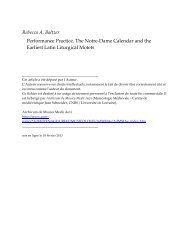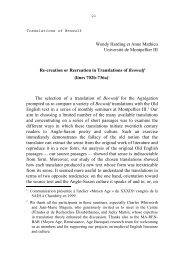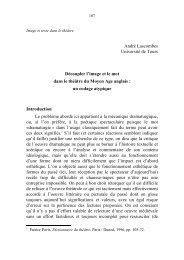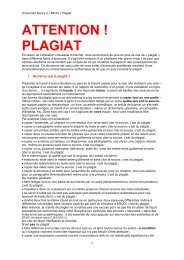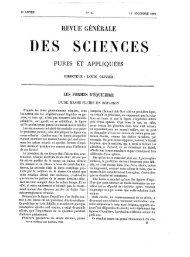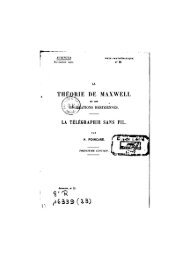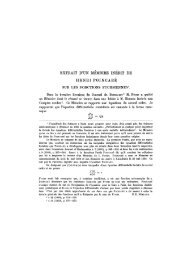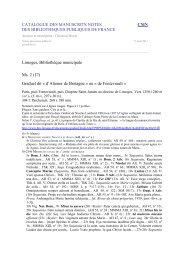You also want an ePaper? Increase the reach of your titles
YUMPU automatically turns print PDFs into web optimized ePapers that Google loves.
110_(12U<br />
Stephen Morrison<br />
Alexander's military achievement. The final instance recounts the last<br />
moments of Marcus Antonius who, before falling on his sword in the<br />
honourable Roman manner, takes refuge lytle werede in the royal<br />
palace.<br />
The most striking characteristic common to all three of these<br />
passages is that the phrase lytle weorode is selected by the translator in<br />
response to phrases where the sense of smallness or fewness is<br />
conveyed by the adjectives paucus and paruus. There is no attempt at<br />
translation word be worde; rather the procedure is andgit of andgiete,<br />
as Ælfred himself (who obviously took an interest in the Englishing of<br />
this text) has it. 16 And the repetition of the phrase on three separate<br />
and unrelated occasions suggests to me that the translator worked, at<br />
times at least, from a stock of literary idioms, and that this was one of<br />
them.<br />
The remaining examples to be examined do nothing to undermine<br />
this assertion. Consider this most unusual gloss to a verse from Luke's<br />
gospel, written into the Lindisfarne Gospels by the priest Aldred in the<br />
mid-tenth century:<br />
Ait autem illi quidam: Domine, si pauci sunt, qui salvantur? 17<br />
cuoeð ða him sum mon, 'Drihten, gif huon sint, vel lytle worado aron,<br />
ða ðe gihæled biðon?'... (Luke 13: 23)<br />
Luke reports that an unnamed man asked Jesus this rather startling<br />
question: "are they few who are to be saved?" The sense of pauci is<br />
conveyed adequately in the English by huon (hwon) which is itself<br />
subject to some form of translation, announced by the Latin vel, in the<br />
form of lytle worado. Although the meaning of "troop" or "small force<br />
16 . Taken from the so-called Preface to the Old English Cura Pastoralis,<br />
conveniently available in Dorothy Whitelock (ed.), Sweet's Anglo-Saxon<br />
Reader in Prose and Verse, 15th ed., Oxford: Clarendon Press, 1967, pp. 4-7;<br />
the phrases are on p. 7.<br />
17 . Taken from Walter W. Skeat (ed.), The Holy Gospels in Anglo-Saxon,<br />
Northumbrian and Mercian Versions, Cambridge: University Press, 1871-<br />
1887.




